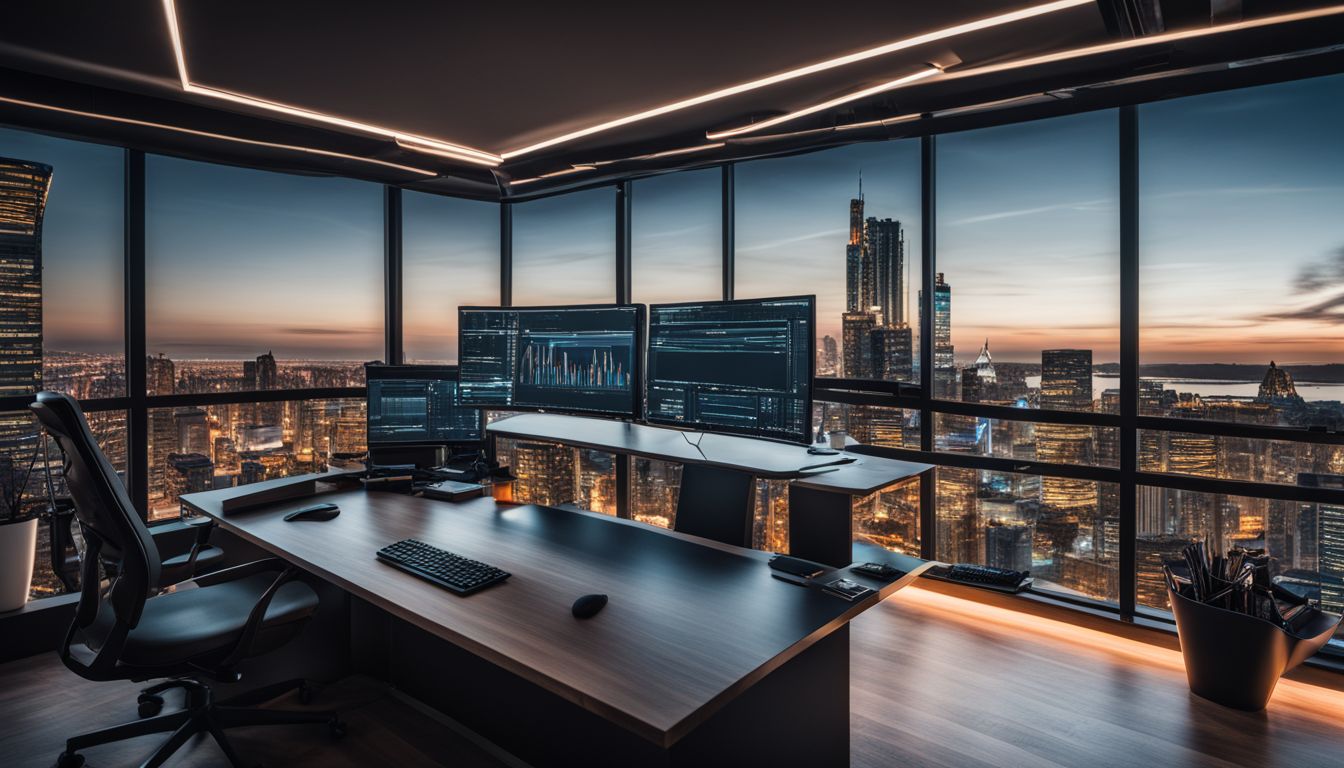Do the prospects of AI stepping into computer programming careers give you pause? You’re not alone. The notion that artificial intelligence might significantly impact our future roles can be quite daunting.
After immersing myself in this subject, I’ve uncovered some fascinating insights to share with you. This article aims to illuminate what lies ahead for software developers and IT professionals.
Stay tuned; it promises to be an enlightening journey!
Key Takeaways
- AI tools like ChatGPT are improving programming by doing routine tasks and finding bugs faster, but they can’t fully replace human programmers. Humans excel in creativity and problem-solving.
- Security, accuracy, and copyright issues with AI – generated code mean that humans must check and improve what AI produces. This teamwork enhances software quality.
- The demand for skilled programmers is growing because people need to guide and work alongside AI. This collaboration leads to better software solutions.
- Devin AI, the first fully autonomous software engineer, shows how advanced AI has become in programming but also highlights the continued need for human oversight.
- While AI changes programming jobs by taking over repetitive tasks, it also creates opportunities for programmers to focus on more complex and innovative work.
The Growing Influence of Artificial Intelligence in Programming

Leaving the introduction behind, we move into discussing how artificial intelligence is changing programming. AI’s role in software development grows stronger every day. Tools like ChatGPT are not just tools anymore; they’re becoming teammates for programmers.
These AI systems can write lines of code and spot mistakes that might take us hours to find.
AI does more than just handle routine tasks. It uses machine learning to predict problems before they happen, making our jobs easier and helping create better software solutions faster.
Imagine a tool that not only writes code but also learns from it. That’s what AI in programming is starting to look like – a smart assistant that enhances productivity at every step.
Can AI Tools Like ChatGPT Replace Computer Programmers?

Many people wonder if AI tools like ChatGPT can take over the jobs of computer programmers. The truth is, while these technologies are smart, they aren’t ready to fully replace humans in coding yet.
Accuracy limitations of AI tools
AI tools like ChatGPT are getting better at jotting down code snippets. Still, they can’t always be trusted to write perfect code. These tools often miss the mark because they lack a deep understanding of algorithms, data structures, and problem-solving skills.
This isn’t just about missing a semi-colon or mixing up variables; it’s about not grasping the full picture of what the software needs to do.
Let’s say you ask an AI to create a program for managing library books. The AI might generate something that looks right but doesn’t handle unexpected situations well, like if a book is lost or damaged.
It shows that while AI can follow instructions, it struggles with thinking outside the box and dealing with complex issues on its own. Now let’s move on and consider how these accuracy issues tie into wider security concerns with AI programming.
Security concerns with AI programming
Many of my industry friends hesitate to use AI tools like ChatGPT for coding. They worry about the safety and trustworthiness of the code these machines spit out. It’s a big deal because if something goes wrong, it could lead to huge problems.
Another thing is, hackers are everywhere, right? And since AI writes code in ways that are predictable once you understand them, it might be easier for bad guys to find weak spots.
This means we have to be extra careful with security when using AI in software making. Now let’s talk about how copyright issues can also pop up with AI programming.
Potential for copyright infringement
AI tools like ChatGPT are smart. They create code fast based on what we tell them. But here’s a snag—these codes might step on someone’s copyright without meaning to. Imagine writing a story and finding it published under someone else’s name.
Doesn’t feel good, right? That’s how creators of original software feel when AI accidentally uses their protected work.
McKinsey Global Institute points out that by 2030, automation could replace many jobs in the U.S., including programming roles. This shift means more reliance on AI for coding tasks, increasing the risk of unintentional copyright problems.
It’s crucial for developers using AI to double-check that the generated output doesn’t use anything copyrighted without permission or proper credit. Keeping creativity legal keeps innovation flowing smoothly.
Comparing Human Intelligence and AI in Writing Code
Humans and AI write code in different ways. Humans bring creativity, problem-solving skills, and a deep understanding of complex systems to the table. We think outside the box, spot security risks before they become problems, and design software that meets specific needs.
On the other hand, AI can churn out lines of code fast thanks to tools like GitHub Copilot. But it often misses the mark on truly understanding what’s needed or creating something new.
AI struggles with tasks needing insight or instinct – areas where human programmers shine. For instance, an AI might generate functional code quickly but overlook important copyright issues or security vulnerabilities that a seasoned developer would catch easily.
While machines excel at repetitive tasks and handling large data sets swiftly, they lack our ability to innovate or fully grasp nuanced project requirements. The future might see these abilities blending more closely as we move into discussing how AI impacts programming jobs.
The Impact of AI on Programming Jobs
AI is changing the game for programming jobs. It’s stepping in to take over tasks that were repetitive and frankly, a bit dull for software developers. Think of those times spent writing code for simple functions or squashing bugs that pop up here and there.
Now, AI tools like chat-based interfaces are on it, freeing up human brains for more creative and complex problem-solving tasks.
This shift doesn’t mean programmers will become obsolete. Far from it! The demand for skilled programmers who can work alongside AI, guiding and improving these intelligent systems, is actually going up.
We’re moving towards a future where humans and machines team up to make the software development lifecycle smoother and more efficient. This collaboration promises not only faster turnaround times but also higher quality end products – a win-win situation if you ask me!
The Future of Programming: AI vs Human Programmers
The future of coding isn’t just about AI taking over. It’s about how we, as programmers, work with these advanced tools. Think of AI as a partner that handles the boring stuff—like writing basic code or finding errors.
This lets us focus on the big ideas and complex problems only humans can solve right now. Tools like ChatGPT are great examples. They suggest snippets based on what we need, saving us time.
AI also steps in to make our codes better by spotting mistakes we might miss. But here’s the thing—AI doesn’t get tired or bored. It goes through loads of data to find and fix bugs more quickly than any person could.
So yeah, programming jobs are changing because of AI technologies like generative AIs and Devin AI—the first fully autonomous software creator out there—but they’re not disappearing.
We’re moving towards a future where coders and their electronic brains team up for smarter, faster results in creating new software systems and applications.
How AI Assists Programmers
AI is like a super-smart buddy for computer programmers. It does more than just help; it changes the game by making their work faster and solving problems in ways that blow the mind.
Think of AI tools as cool gadgets that give coders superpowers—speeding up how they make apps, websites, and all sorts of digital magic. With these gadgets, coding feels less like homework and more like unlocking secrets to new worlds.
Curious? Keep reading to discover how this tech friendship is making big waves in the world of code writing!
Improving productivity with AI
AI has changed how I do my coding work, making me faster and smarter. It’s like having a super tool that spots my mistakes and gives me shortcuts.
Here’s how AI boosts my productivity:
- Automates boring stuff: AI takes over the tasks I find dull. Think copying code or checking for tiny errors. This means I spend more time solving big problems.
- Generates code snippets: Sometimes, I just tell the AI what I need, like a piece of a website or an app function, and it writes the basic code for me. It’s a huge time-saver.
- Finds bugs quickly: Before AI, finding bugs was like looking for a needle in a haystack. Now, AI scans thousands of lines of code in seconds to point out where things went wrong.
- Estimates project timelines: Guessing how long a project might take used to be tough. AI looks at all the projects I’ve done before and predicts how long new ones will take.
- Helps with understanding code: Ever get stuck trying to figure out what someone else’s code does? AI tools break it down into simple explanations so I can catch up quickly.
- Suggests improvements: Not only does AI find problems, but it also suggests how to make my code better and faster.
- Assists in learning new skills: Whenever there’s something new to learn, AI points me to tutorials and examples that match my style of coding and learning pace.
- Streamlines teamwork: Sharing updates with team members is easier because AI helps manage our code changes smoothly.
- Enhances creativity: With the basic tasks off my plate, I have more time to think creatively about solving problems in new ways.
- Keeps documentation up-to-date: Finally, keeping documents updated used to be tedious but essential work, now AI can generate and update those based on recent changes automatically.
I’ve found these methods invaluable for staying ahead in this fast-paced tech world without feeling overwhelmed by the workload or deadlines.
Enhancing problem-solving capabilities with AI tools
AI tools have turned the game around for us programmers and software engineers. They’re like a new superpower, making us more efficient at solving problems. Here’s how they do it:
- Automating tedious tasks: Think of all those repetitive things we do every day. AI can handle them for us. This frees up our brains to tackle bigger, tougher problems that really need human creativity.
- Finding and fixing bugs faster: Ever spent hours looking for a tiny mistake in your code? AI tools can scan through lines of code in seconds and spot errors that might take us forever to find.
- Suggesting code improvements: It’s like having a wise mentor who whispers better ways to write our code. AI algorithms analyze our work and offer suggestions to make it run smoother and faster.
- Generating code snippets: Sometimes, we know what we want our program to do, but turning that idea into code can be tough. AI helps here by generating chunks of code based on what we tell it we need.
- Boosting overall software quality: With AI’s help, not only do we solve problems more efficiently, but the end products we create are stronger, faster, and less likely to break down.
- Allowing focus on creative solutions: With the grunt work handled by AI, I find myself with more energy and brainpower to dream up innovative solutions and approaches that a machine just couldn’t think of.
- Improving teamwork: Yes, AI even makes working with my team easier! We use AI tools to merge our ideas smoothly and harmonize different parts of a project without stepping on each other’s toes.
In short, integrating AI into our problem-solving process hasn’t just made us faster; it’s made us smarter programmers and engineers too.
Case Study: Devin AI, the First Fully Autonomous AI Software Engineer
Devin AI made headlines as the very first, self-governing artificial intelligence software engineer. This groundbreaking technology shows us a glimpse into the future of software development.
Devin can write code, find and fix issues, and even estimate how long projects will take—tasks that used to need a person. This shift highlights how far AI has come in automating parts of programming that are repetitive or time-consuming.
This case isn’t just about making jobs obsolete; rather, it’s about reshaping what roles humans play in tech fields like data science and web development. Devin’s ability relies on complex algorithms and natural language processing to understand tasks and execute them accurately without human help.
This innovation encourages programmers to focus more on creative problem-solving while leaving the heavy lifting to artificial minds like Devin’s.
Will AI Completely Replace Software Engineers and Programmers?
AI won’t kick software developers and coders to the curb anytime soon. Many folks worry that AI, like ChatGPT, might take over their jobs. But here’s the scoop – AI helps more than it harms.
It takes care of the dull stuff, finds mistakes, predicts troubles ahead, and makes teamwork smoother. This means programmers can tackle complex problems without sweating the small stuff.
But AI isn’t perfect. Sometimes it churns out incorrect code or opens doors for hackers. And when faced with something totally new, it might just throw its hands up in confusion because it can’t think outside the box or innovate like humans do.
Next, let’s look at what this all means for your career plans in tech.
Conclusion
The future of programming looks bright with both human minds and AI working together. No, AI won’t kick computer science majors out of their jobs. Instead, it will give them tools to become even better at what they do.
Think about this – as AI takes over the boring stuff, programmers get to solve bigger problems and invent new things. We’re stepping into a time where our talents combined with AI’s efficiency lead to incredible software creations.
It’s not humans versus machines; it’s humans plus machines making the future exciting for everyone in programming.

